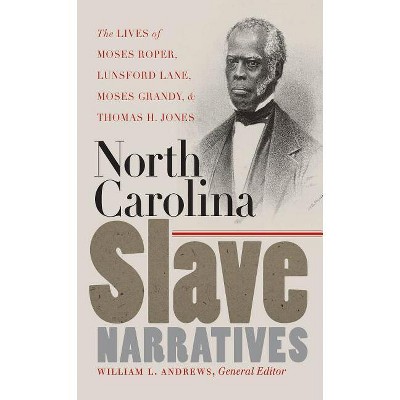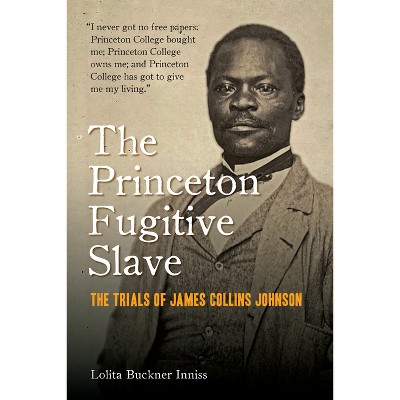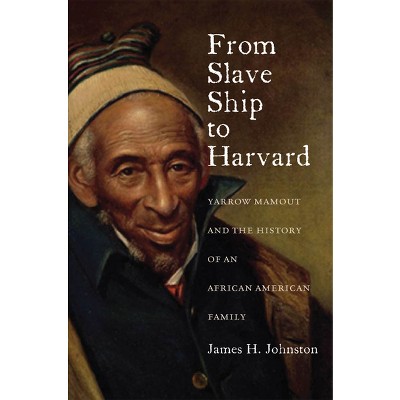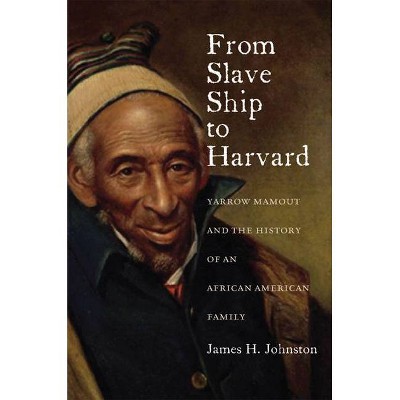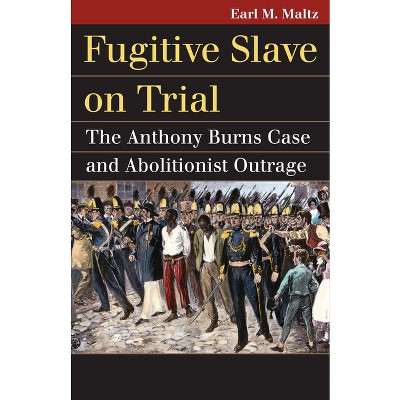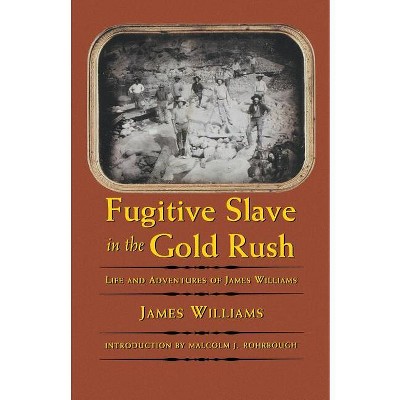$19.79 sale price when purchased online
$21.95 list price
Target Online store #3991
About this item
Highlights
- WINNER, NEW JERSEY STUDIES ACADEMIC ALLIANCE BOOK AWARD James Collins Johnson made his name by escaping slavery in Maryland and fleeing to Princeton, New Jersey, where he built a life in a bustling community of African Americans working at what is now Princeton University.
- About the Author: Lolita Buckner Inniss, J.D., LL.M., Ph.D., is a professor at Southern Methodist University Dedman School of Law, where she is a Robert G. Storey Distinguished Faculty Fellow.
- 272 Pages
- Social Science, Slavery
Description
About the Book
Johnson was an escaped slave working at Princeton University in 1843 when he was arrested and tried as a fugitive. Though convicted and slated for return to slavery, he was redeemed by a local white woman. Johnson became one of the best-known vendors at Princeton over his six-decade career.Book Synopsis
WINNER, NEW JERSEY STUDIES ACADEMIC ALLIANCE BOOK AWARD
James Collins Johnson made his name by escaping slavery in Maryland and fleeing to Princeton, New Jersey, where he built a life in a bustling community of African Americans working at what is now Princeton University. After only four years, he was recognized by a student from Maryland, arrested, and subjected to a trial for extradition under the 1793 Fugitive Slave Act. On the eve of his rendition, after attempts to free Johnson by force had failed, a local aristocratic white woman purchased Johnson's freedom, allowing him to avoid re-enslavement. The Princeton Fugitive Slave reconstructs James Collins Johnson's life, from birth and enslaved life in Maryland to his daring escape, sensational trial for re-enslavement, and last-minute change of fortune, and through to the end of his life in Princeton, where he remained a figure of local fascination. Stories of Johnson's life in Princeton often describe him as a contented, jovial soul, beloved on campus and memorialized on his gravestone as "The Students Friend." But these familiar accounts come from student writings and sentimental recollections in alumni reports--stories from elite, predominantly white, often southern sources whose relationships with Johnson were hopelessly distorted by differences in race and social standing. In interrogating these stories against archival records, newspaper accounts, courtroom narratives, photographs, and family histories, author Lolita Buckner Inniss builds a picture of Johnson on his own terms, piecing together the sparse evidence and disaggregating him from the other black vendors with whom he was sometimes confused. By telling Johnson's story and examining the relationship between antebellum Princeton's black residents and the economic engine that supported their community, the book questions the distinction between employment and servitude that shrinks and threatens to disappear when an individual's freedom is circumscribed by immobility, lack of opportunity, and contingency on local interpretations of a hotly contested body of law.Review Quotes
Inniss has richly transformed Johnson's story from that of an escapee from a "kind slave master," saved by a white woman, and beloved by Princeton students as a sweet, jovial darling into a much more nuanced portrait of a human being. Her portrayal raised important questions about what it means to be free, and where the line lies between work and servitude. Most of all it is a lesson in the critical importance in listening to the narrative of each person.-- "Center for Compassionate Leadership"
The Princeton Fugitive Slave is fascinating historical detective work. Lolita Buckner Inniss has recovered the journey of James Collins Johnson from his youth as a slave on the Maryland Eastern Shore to his life as a free man in Princeton. Deeply researched, the book overturns any lingering idea that Princeton was a haven from the broader society. Johnson had to cope with the casual racism of students, occasional eruptions of racial violence in town and the ubiquitous use of the N-word by even the supposedly educated. This book contributes to our understanding of slavery's legacy today.---Shane White, author of Prince of Darkness: The Untold Story of Jeremiah G. Hamilton, Wall Street's First Black Millionaire
A rare story. James Collins Johnson was a legend among Princeton students, and Inniss provides enriching detail to explain what slave life was like, the difficulties of escape, the practical operation of the fugitive slave law, and why an owner would bother to seek a slave's return four years after he left. Johnson's saga is one example of the hurdles faced by fugitive slaves and of race relations in the 19th century in slave-holding Maryland and the free state of New Jersey.---James H. Johnston, author of From Slave Ship to Harvard: Yarrow Mamout and the History of an African American Family
Collectively, Inniss's work provides an exciting model for future scholars of slavery and labor. Perhaps most importantly, Inniss skillfully and compassionately restores Johnson's voice to his own historical narrative.---G. Patrick O'Brien, H-Slavery
About the Author
Lolita Buckner Inniss, J.D., LL.M., Ph.D., is a professor at Southern Methodist University Dedman School of Law, where she is a Robert G. Storey Distinguished Faculty Fellow. Her research addresses historic, geographic, metaphoric, and visual norms of law, especially in the context of race, gender, and comparative constitutionalism.Dimensions (Overall): 9.0 Inches (H) x 6.0 Inches (W) x .61 Inches (D)
Weight: .89 Pounds
Suggested Age: 22 Years and Up
Number of Pages: 272
Genre: Social Science
Sub-Genre: Slavery
Publisher: Fordham University Press
Format: Paperback
Author: Lolita Buckner Inniss
Language: English
Street Date: June 1, 2021
TCIN: 1003617532
UPC: 9780823294077
Item Number (DPCI): 247-25-2456
Origin: Made in the USA or Imported
Shipping details
Estimated ship dimensions: 0.61 inches length x 6 inches width x 9 inches height
Estimated ship weight: 0.89 pounds
We regret that this item cannot be shipped to PO Boxes.
This item cannot be shipped to the following locations: American Samoa (see also separate entry under AS), Guam (see also separate entry under GU), Northern Mariana Islands, Puerto Rico (see also separate entry under PR), United States Minor Outlying Islands, Virgin Islands, U.S., APO/FPO
Return details
This item can be returned to any Target store or Target.com.
This item must be returned within 90 days of the date it was purchased in store, shipped, delivered by a Shipt shopper, or made ready for pickup.
See the return policy for complete information.

